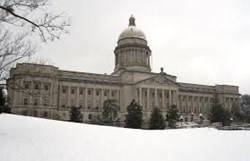No reason for districts to expect relief from SEEK shortfall
This from Brad Hughes at
KSBA:
Education
Commissioner Terry Holliday has asked the Beshear administration to step
up and address the impact of this year’s projected SEEK funding
shortfall. Initially, at least, the response is less than promising.
 In
the March 13 Fast Five on Friday email to state and local school
leaders, Holliday released his Feb. 12 letter Mary Lassiter, secretary
of Gov. Steve Beshear’s executive cabinet, requesting an additional $8
million to cover the shortfall “ to alleviate the financial burden that
this shortfall will place on our school districts.”
In
the March 13 Fast Five on Friday email to state and local school
leaders, Holliday released his Feb. 12 letter Mary Lassiter, secretary
of Gov. Steve Beshear’s executive cabinet, requesting an additional $8
million to cover the shortfall “ to alleviate the financial burden that
this shortfall will place on our school districts.”
“This
shortfall is not a budget reduction, but represents the amount by which
actual SEEK formula-generated needs for school districts exceeded the
appropriated amount for FY 2015. The full amount of funding appropriated
by the General Assembly will still be distributed to school districts,
but is inadequate,” Holiday wrote.
“Based on information in the
Quarterly Economic and Revenue Report for the second quarter, it appears
the state General Fund revenues are improving and could end the year
with a surplus. Accordingly, an opportunity may be available to
alleviate this shortfall. Therefore in my capacity of Commissioner of
Education, I respectfully request that the SEEK appropriation be
increased to cover the SEEK shortfall for 2015,” the commissioner wrote.
On
March 9 response, State Budget Director Jane Driskell responded to
Holliday, acknowledging the request but calling it “premature.”
“Funding
for the SEEK formula continues to be the Governor’s highest priority
as evidenced by the commitment in the Governor’s budget for this
biennium,” Driskell wrote. “However, for the first time the financing of
Necessary Government Expenses (NGE) which have averaged $44 million
over the past three years, is entirely from the Budget Reserve Trust
Fund. As you know, NGE includes expenditures such as calling out the
National Guard to assist with natural disasters, costs of fighting
forest fires, and paying for more incarcerated felons than budgeted.
“It
is our current expectation that this fiscal year NGE requirements will
be at least as much as recent years. So preserving the health of the
Budget Reserve Trust Fund is another issue to which we must pay close
attention,” the budget director said.
“Therefore, your request is
premature at this time. We will continue to closely review the
Commonwealth’s budget situation as we move closer to the end of the
fiscal year, to determine what options, if any, we may have.”
At
the December meeting of the Kentucky Association of School
Superintendents, Holliday first announced his agency’s expectations of a
SEEK shortfall. At the time, he cited three factors that caused the
shortfall:
• Lower than projected property assessments
• A higher than projected Prior Year End-of-Year Adjusted Average Daily Attendance
• Higher than projected Exceptional Child counts in categories of low and moderate incidence
“Although
the total SEEK appropriation remains unchanged, districts should
anticipate an approximate reduction (of less than 1 percent) in their
district SEEK allocations for this year, which will be reflected in the
payments for the final quarter (April, May, June),” Holliday said at
that time.
“Per statute, a shortfall means that there will be no funds
available for a January growth adjustment or for adjusted assessments.”
In the March 13 Fast Five on Friday email to state and local school leaders, Holliday released his Feb. 12 letter Mary Lassiter, secretary of Gov. Steve Beshear’s executive cabinet, requesting an additional $8 million to cover the shortfall “ to alleviate the financial burden that this shortfall will place on our school districts.”
1 comment:
It still continues to baffle me that there can be SEEK short falls based upon these reasons.
I have read all the article in the paper about property tax assessments and collections but if you are basing your collection on what the previous year provided, how can there be lower assessment amounts?
Equally, we don't have that many new students coming into the system, so why is there such a significant increase in exceptionalities and if so wouldn't that result in creased federal funds?
Finally, students are going to school more than expected and as a result schools are going to get less money? How ironic.
Now you tell me who isn't doing their job with budgets, schools or state officials? No doubt schools will be encouraged again to increase local collection rates in order to make up for state under funding.
What a joke, telling the population how important education is, but not investing in its students or its educators.
Post a Comment